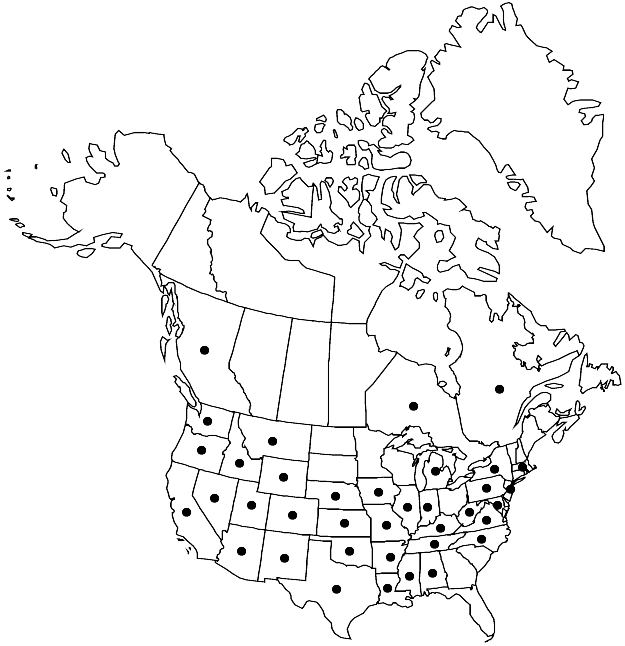Erysimum repandum
Demonstr. Pl., 17. 1753.
Annuals. Trichomes of leaves 2-rayed, mixed with fewer 3-rayed ones. Stems erect, unbranched or branched basally, (0.4–)1.5–4.5(–7) dm. Basal leaves (often withered by fruiting), similar to cauline. Cauline leaves: (proximal and median) petiolate and (distal) sessile, (petiole (0.3–)0.5–2(–3) cm); blade [linear, narrowly oblanceolate, elliptic, or oblong, (1–)2–8(–11) cm × (2–)5–12(–17) mm, base attenuate], margins sinuate or coarsely dentate to denticulate or repand, (distal) entire or denticulate, (apex acute). Racemes considerably elongated in fruit. Fruiting pedicels divaricate, stout, as wide as fruit, 2–4(–6) mm. Flowers: sepals linear-oblong, 4–6 mm, lateral pair not saccate basally; petals yellow, narrowly oblanceolate to spatulate, 6–8 × 1.5–2 mm, claw 3–6 mm, apex rounded; median filaments 4–6 mm; anthers narrowly oblong, 0.8–1.3 mm. Fruits widely spreading to divaricate-ascending, narrowly linear, straight or curved upward, somewhat torulose, (2–)3–8(–10) cm × 1.5–2 mm, 4-angled, not striped; valves with prominent midvein, pubescent outside, trichomes 2-rayed and, fewer, 3-rayed, often glabrous, sometimes pubescent inside; ovules (40–)50–80(–90) per ovary; style cylindrical or subclavate, stout, 1–4 mm, sparsely pubescent; stigma slightly 2-lobed, lobes as long as wide. Seeds oblong, 1.1–1.5 × 0.6–0.7 mm; not winged or, rarely, winged distally. 2n = 16.
Phenology: Flowering Apr–Jun.
Habitat: Disturbed sites, roadsides, fields, waste places, barren hillsides, brush communities, pastures
Elevation: 0-2100 m
Distribution

Introduced; B.C., Ont., Que., Ala., Ariz., Ark., Calif., Colo., Idaho, Ill., Ind., Iowa, Kans., Ky., La., Md., Mass., Mich., Miss., Mo., Mont., Nebr., Nev., N.J., N.Mex., N.Y., N.C., Okla., Oreg., Pa., Tenn., Tex., Utah, Va., Wash., W.Va., Wyo., Eurasia, n Africa, introduced also in South America, Australia.
Discussion
Selected References
None.